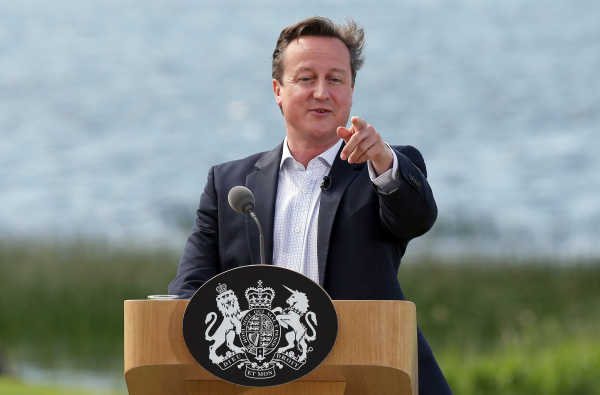8 October 2015
British Government locked into negative and partisan approach towards Stormont talks

● British Prime Minister David Cameron – gratuitous reproach of Sinn Féin
ROUTINELY, on an almost daily basis, a statement is issued in the name of British Secretary of State Theresa Villiers to advise of “focussed discussions”, “frank exchanges”, “steady progress”, and other descriptions of the plenary discussions occurring at the new Stormont House talks.
These statements read and sound like report cards from a school inspector pronouncing upon the pupils’ conduct and attention to their lessons.
They are as ridiculous as they are patronising and arrogant.
There presently is no momentum within the talks process.
What’s happening is an action replay of the British and Irish governments’ approach to the process last winter which culminated in the Stormont House Agreement.
The British Government in particular is posturing as some type of referee or arbiter. And that is the central faultline which denies any dynamic to these talks.
The British Government is not a referee.
It needs to start taking responsibility for what the Tories have deliberately neglected since they came to power in 2010 – that is to act as a co-guarantor with the Irish Government for even-handed management of the peace and political processes.
This political crisis is the inevitable culmination of British disengagement and negative mismanagement, and Irish Government semi-detachment and passivity. The existing and escalating political difficulties have been exacerbated by the austerity crisis unleashed by the Tories in the North.
It suits this British Government for there to be no dynamic or momentum and to remain aloof from active participation in the talks.
But make no mistake about it; there is a “plan”! And that is, while the five parties do round-table discussions, British officials in the background are drafting legislation and documents designed to predetermine the talks outcomes, even at this stage.
Their periodic circulation is meant to create the illusion of building consensus.
Not surprisingly, attempting to dilute and reverse previously-agreed positions is part of this manoeuvre.
That’s clear to be seen in the draft legislation for dealing with the past recently submitted by British officials that seeks to further distance the British Government from its obligations to maximum disclosure under the Stormont House Agreement.
That is not acceptable to Sinn Féin.
However, it is part of a build-up to “take it or leave it” proposals being set down by the British.
This is not the way to do proper politics – but it is this British Government’s way of doing business.
The scene has already begun to be set for such a game plan with the recent interviews by Prime Minister David Cameron and Theresa Villiers prior to and during the Conservative Party conference. These interventions have been typically partisan and pro-unionist.
Cameron’s gratuitous reproach of Sinn Féin with his reference to politicians “holding ballot boxes and guns”, during a UTV interview last Monday night, clearly reflects British policy.
In rebukes of both Sinn Féin and the SDLP, Cameron and Villiers have demanded that Tory welfare cuts are accepted.
They have also now set the end of October as a deadline by which time the talks must be concluded.
The most recent negative public intervention by Villiers has been to threaten a return of direct rule.
The British appear to be proactively conditioning public opinion for the imposition of ‘take it or leave it’ demands limited to “paramilitarism and welfare”, combined with dilution of the Stormont House Agreement. Arguably, this would have an appeal to the Irish Government as a backdrop to the next Southern general election.
Put simply, as the political crisis deepens, this British Government is politically positioning itself to try and impose its own predetermined talks outcomes and to justify the subsequent blame game.
This approach reduces the political process to a travesty, undermines the Good Friday Agreement, hollows out the Stormont House Agreement, and ridicules the very Peace Process itself.
The British Government and the NIO are not neutral.
Britain is part of the problem with huge challenges to face in terms of its role in the conflict, involvement in collusion, human rights violations, ideological aversion to neutrality and impartiality, and its strategic responsibility to the political process.
The Tories must not be allowed to sidestep the scale of the North’s economic problems and the irrefutable ‘special circumstances’ which exist in the Six Counties as a result of partition and the conflict.
Providing a sustainable budget and economic stimulus package must be central to the current talks process.
The question is whether the British Government and the Irish Government really want to be part of contributing to a successful talks outcome which will empower transformational politics in the North and ensure we are not pushed back into permanent political instability.
The political pattern being recycled by the approach of the two governments, left unchecked, will only take us all in one direction and with one consequence – failure.
That scenario must be avoided.
Positive interventions by civic society, and Irish democratic opinion – as well as the significant political influence of the European community, Irish America and the US administration – are now more important than ever.
These voices need to reinforce the message that success will depend upon leadership from every political party and equally from both governments.
The British Government should step up to the mark immediately, get properly involved in the talks, and fulfil its responsibilities to guarantee political progress and a sustainable economic future in the North.
Follow us on Facebook
An Phoblacht on Twitter
Uncomfortable Conversations

An initiative for dialogue
for reconciliation
— — — — — — —
Contributions from key figures in the churches, academia and wider civic society as well as senior republican figures





